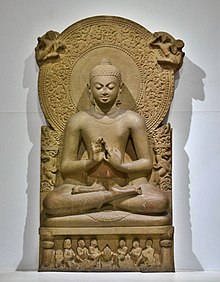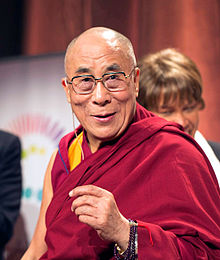Wikijunior:World Religions/Buddhism

How many people follow Buddhism?
[edit | edit source]
There are about 250–500 million followers. It is the fourth largest religion in the world.
Where is Buddhism practiced?
[edit | edit source]Buddhism is practiced mainly in Asia. The Asian countries where it is practiced include Sri Lanka, Cambodia, Laos, Thailand, Burma, China, Japan, Korea, Taiwan, Singapore, Vietnam, Tibet, Bhutan, and Mongolia. There are many people from all over the world that practice Buddhism.
What are the main beliefs of Buddhism?
[edit | edit source]
In Buddhism there is the belief of reincarnation. Reincarnation means that after you die you are reborn again into a different form of life. Reincarnation happens because a person or living creature cannot escape the cycle of unhappiness. Buddhism preaches that unhappiness is something that happens over and over again. The way to end unhappiness and reincarnation is through understanding what Buddhists call "The Four Noble Truths".
What are The Four Noble Truths? The Four Noble Truths are teachings by the Buddha. The first Noble Truth is called the "Truth of Suffering". The second Noble Truth is called the "Arising of Suffering". The third Noble Truth is the "Cessation of Suffering" and the last Noble truth is "The Path out of Suffering".
Buddhists also believe in karma. Karma is an action that a person takes which causes an effect. This means that what you do has an effect on things. Karma changes the past, present and future. Buddhists believe that practicing good actions can put a person on the path towards ending reincarnation and becoming "enlightened". Enlightenment happens when a person changes their path or cycle of reincarnation.
The last Noble Truth (The Path out of Suffering) teaches the Eightfold Path. The Eightfold Path is a teaching by the Buddha about how to end reincarnation and reach Nirvana. What is Nirvana? Nirvana is when a person has freed themselves from the cycle of reincarnation and unhappiness/suffering. To reach Nirvana is almost always the goal of many Buddhists.
A buddha is a person who has reached Nirvana.
What texts does Buddhism hold sacred?
[edit | edit source]The Dhammapada is a collection of written verses by the Buddha. The Dhammapada tells a person how to practice Buddhist beliefs.
What are some main holidays and practices of Buddhism?
[edit | edit source]Vesak happens on the first full moon day in May or June and celebrates Buddha's birthday.
What is the history of Buddhism?
[edit | edit source]
The beginning of Buddhism begins with an Indian prince named Siddhartha Gauthama who was born in the year 623 BCE in the country of Nepal. When Siddhartha was 29 years old, he left his palace to find Nirvana or the "Complete cease of rebirth/reincarntion". At age 35 he attained Nirvana and was known from then on as "Lord Buddha". He preached what he found for 45 years and died in 483, aged 80 in Kusinara (now Kushinagar) in India. Even though he is known as "Buddha" there have been buddhas before he was born and possibly after he was born.
Who are some famous people who have practiced Buddhism?
[edit | edit source]
The 14th Dalai Lama (religious name: Tenzin Gyatso) is a follower of Buddhism. He follows a branch of Buddhism called Tibetan Buddhism. He is a spiritual leader for many people and is believed by some to be a reincarnation of a Bodhisattva (a person who has the compassion of buddhas).
What is a story from Buddhism?
[edit | edit source]When Siddhartha Gauthama left his palace he saw things he had never seen before. The prince had spent his whole life inside the palace and didn't know what life was like outside of the palace. When he left he saw three things which made him want to end suffering. He saw a sick man, a dead body and an ascetic. An ascetic is a person who practices spirituality and seeks spiritual freedom. When Siddhartha saw the sick man and the dead body he realized that people could not escape sickness and death. Seeing the ascetic inspired him to find spiritual freedom and live a life dedicated towards finding spiritual truths.
Further reading
[edit | edit source]